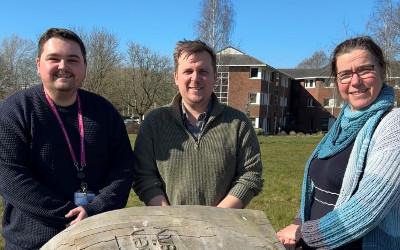OU awarded £140k to advance innovative cancer therapy research

The Open University (OU) has been awarded £139,539 in research funding to lead a transformative project titled ‘Shining a light on sarcoma: an innovative treatment’. This pioneering initiative seeks to revolutionise the treatment of sarcomas — a rare and challenging group of cancers — through a novel light-activated approach.
The interdisciplinary research team from the OU’s Faculty of Science, Technology, Engineering and Mathematics (STEM) is led by Dr Daniel Payne, in collaboration with Dr Calum McMullen and Dr Katja Reitdorf, who are experts in biomedical sciences and cell imaging. The OU team will work in collaboration with Excellio Labs Ltd., a Scottish biotechnology company specialising in targeted drug-delivery systems. Their work builds on the promise of photodynamic therapy (PDT), a minimally invasive treatment that uses light-activated drugs to destroy cancer cells while sparing healthy tissue.
While PDT is already used in some cancers, its effectiveness is currently limited by poor drug selectivity. This project will explore how naturally derived vesicles — nanoscale carriers isolated from patients’ own cells — can be loaded with therapeutic agents to deliver treatment directly to tumours with greater precision and fewer side effects. The team will specifically focus on sarcoma-derived vesicles to target subtypes of the disease located near the skin’s surface, where light activation is feasible.
The research will assess the ability of vesicle-loaded photosensitisers to increase the accuracy and toxicity of cancer cell destruction in both 2D and 3D lab-grown sarcoma models. Additionally, the team will explore the potential for clinical translation by isolating and testing vesicles from primary soft tissue sarcoma cells against a 3D model.
This project exemplifies The Open University’s commitment to tackling urgent global health issues through cutting-edge, collaborative research. It aligns closely with the University’s Open Societal Challenges (OSC) framework by seeking to improve health equity and outcomes for patients with rare cancers — an area often underrepresented in research funding and innovation. You can find out more about the related Targeted AntiCancer Therapies (TACT) OSC project on the OSC website.
Through this work, the OU continues to demonstrate its strength in translational research that can directly impact lives. By developing more targeted and less invasive cancer treatments, this project holds real-world potential to enhance patient care, reduce treatment side effects, and open new pathways for personalised cancer therapies.
About Open Societal Challenges
The OU’s Open Societal Challenges programme aims to tackle some of the most important societal challenges of our time through impact-driven research.
The programme’s focus on the themes of Tackling Inequalities, Living Well and Sustainability align well with the OU’s mission to be open to people, places, methods and ideas.
The programme’s aim is to apply excellent research by OU academics to some of the most pressing challenges facing people across the UK and worldwide to transform lives and drive societal change.
Quarterly Review of Research
Read our Quarterly Review of Research to learn about our latest quality academic output.

Contact our news team
For all out of hours enquiries, please telephone +44 (0)7901 515891
Contact details